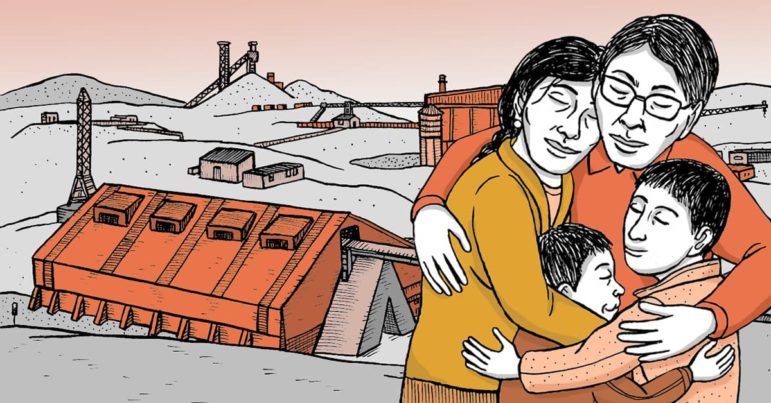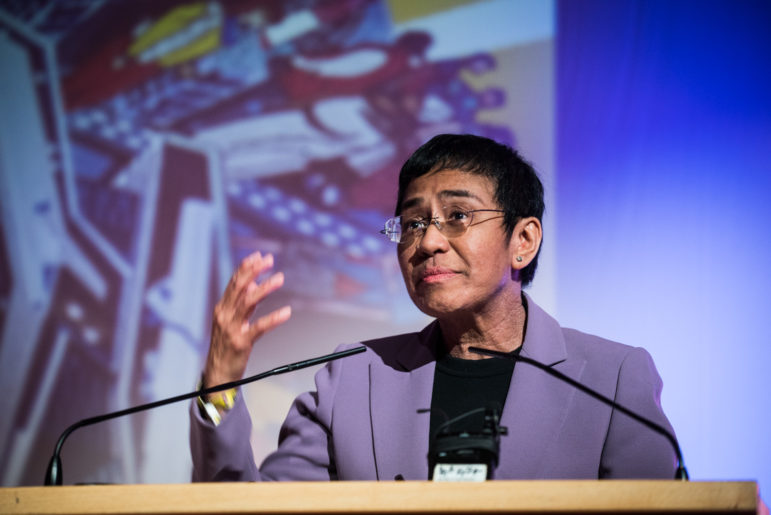

Image: Shutterstock
How Mobile Investigative Newsrooms Can Restore Citizens’ Faith in Journalism
Read this article in
The lakeside location, historic churches, and pretty cobbled streets of Ohrid in North Macedonia draw hundreds of thousands of tourists each year.
But the city’s status as a UNESCO-protected gem has not defended it from rampant overdevelopment and corruption.
When notorious local politician and businessman Nefi Useini began to illegally build a pizzeria near an ancient plane tree and assaulted a building inspector visiting the site, a pioneering group of North Macedonian journalists decided it was time to act.
The entire 10-strong team of reporters, editors, and video producers from the Investigative Reporting Lab (IRL), an OCCRP member center normally based in the capital Skopje, decamped to Ohrid for two weeks and set up what they called a “mobile newsroom.”
They rented office space, held meetings with residents, and began to compile evidence about corruption taking place at the hands of local officials.
Taking Time to Build Trust with the Community in Ohrid
Before relocating to Ohrid, IRL worked for months to gain trust from the local community, introducing their team members on social media and posting information on their goals and previous work.

The Investigative Reporting Lab team at the information stand they set up under the ancient plane tree where a local politician was illegally trying to build a pizzeria. Image: OCCRP
Once they arrived, they set up an information stand for citizens emblazoned with the slogan “Let’s Destroy Corruption Before It Destroys Macedonia” — under the very same plane tree where Useini was building his pizzeria.
Revealing the Rotten Systems Enabling Violence and Corruption
Thanks to the valuable information gathered from residents through the mobile newsroom project in Ohrid, IRL produced an exposé that revealed how Useini had never received a major judicial penalty despite numerous incidents of violence, illegal construction, and other legal violations.
The story showed how a rotten political and judicial system enabled alleged law-breaking, violence, and corruption. (Useini has since faced multiple investigations which are still ongoing, but have forced him out of politics.)
The report gained more than 70,000 views on IRL’s YouTube channel in a matter of weeks. In a country where trust in the media is low due to the alignment of outlets with business or political interests, it was a huge achievement.
That was in 2019.
Since then, IRL has set up multiple successful mobile newsrooms across North Macedonia in areas that had become news deserts, with little or no quality local media, and has been inundated with requests from residents asking their team to come and investigate crime and corruption in their area.
Relationships with Readers Enables Citizen Journalism
“At the beginning, we selected the regions and topics ourselves. Nowadays, they primarily arise from citizen reports,” said Saska Cvetkovska, IRL’s editor-in-chief.
The project has also built up lasting reader loyalty and engagement with IRL’s work.
“With each region we visited, the audience from that region grew, and they have continued to follow us to this day,” Cvetkovska said.
Powerful figures unaccustomed to media scrutiny have tried to impede their work: One mayor expelled IRL’s mobile newsroom journalists from his municipality during an open day he was holding for citizens.
The team has also been targeted more broadly as press freedom campaigners warn that critical journalism in the country is increasingly under attack. A judge ruled last year that IRL was “non-media” and that its members were not journalists, recommending that the justice ministry shut it down. IRL has appealed the ruling and is waiting for its case to be heard.
While IRL’s work will likely continue to rattle cages, Cvetskovska envisages its mobile newsrooms as a unifying force for the public, rebuilding their trust in journalism by producing verified, engaging, and impactful stories that matter to them, and drawing them back from the online misinformation and disinformation that fuels political polarization.
‘Investigative Journalist Sisterhood’ Inspires Re:Baltica and Brings Mobile Newsrooms to Latvia
The project has also inspired other investigative reporting teams. OCCRP’s Latvian member center Re:Baltica set up its own mobile newsroom after its editor-in-chief, Sanita Jemberga, heard Cvetkovska discussing IRL’s work.
Journalists from Re:Baltica’s team joined journalists from independent local media outlet Chayka.lv and pitched a tent on a central street in Latvia’s remote second-largest city, Daugavpils, which has a predominantly Russian-speaking community.
In the course of a week in August 2023 they spoke with 150 residents about their interests and concerns, including some allegations over the spending of the local mayor.
After Jemberga was photographed alongside Mayor Andrejs Elksniņš, a reader wrote in to point out that he was wearing a pair of shoes that cost nearly €1,000 (US$1,100). This fed into an investigation into his lavish lifestyle and how his spending apparently dwarfed his official salary.

Re:Baltica Editor-in-Chief Sanita Jemberga (left) standing alongside Mayor Andrejs Elksniņš at the site of Re:Baltica’s mobile newsroom in Daugavpils, Latvia. A reader later flagged his pricy shoes, which prompted a Re:Baltica investigation into his lavish lifestyle. Image: OCCRP
Re:Baltica mentored the local journalists and helped them produce their own stories on local issues.
Meeting the Russian Speakers Who Helped Reveal Complexities in Daugavpils
The journalists’ conversations with local people gave them insights into tensions within the Russian-speaking community over Moscow’s full-scale invasion of Ukraine. That fed into a four-part documentary series titled “Divided” and inspired the team to produce a theater show that sold out in the capital, Riga, and played to an almost full house in Daugavpils.
The stage production, set on a train between the two cities, wove together personal stories written by the journalists who worked on the project, including real-life dialogues with their interviewees in Daugavpils. Actors played the interviewees, and the reporters played themselves.
The Re:Baltica team in front of their mobile newsroom in Daugavpils, Latvia. Image: Irina Maskaļenko, chayka.lv.
“The reviews were splendid. Main theme: finally someone said how I feel. Not a few people in the hall cried and later said it was like a therapy session,” Jemberga said.
For Jemberga, the experience also emphasized the need for journalists to support each other.
“When I came back from Daugavpils I wrote an open love letter to Saska [Cvetkovska], which reached her at what turned out to be a low point for her. I look at this as part of the investigative journalist sisterhood. You know there is someone in reach who will pick you up, inspire you, and give advice on how to do things you haven’t done before.”
However, the project also triggered a backlash from Latvian authorities and cultural institutions — one state-backed media fund fined the Re:Baltica team for having too many people in the documentary series speaking Russian, demanding that they return more than €30,000 (US$33,000) in funding for the project. Re:Baltica is appealing that decision.
“The level of the hate campaign towards us was such as I have never seen before — for the basic reason that we were reminding people that Russian speakers are part of our community, have rights, and are entitled to opinions which may differ from ours, as long as they recognize that Latvia is an independent country and do not call for Russia to invade,” Jemberga said.
There was a silver lining though — last week Re:Baltica won two prizes at the Latvian Journalists’ Association’s annual awards for excellence, one for its investigation into the illegal financing of a Latvian political party and a separate special prize for the “Divided” documentary series.

The Re:Baltica team celebrates winning two 2024 awards from the Latvian Journalists’ Association. Image: OCCRP
At a time when Re:Baltica continues to be under attack for its work, the support of the local media community meant a lot, said Jemberga.
“We have never seen so much obstruction from state institutions and so much hate online as we had for this,” Jemberga said of the “Divided” project.
“Colleagues were often afraid to defend us so as not to be attacked themselves. That is why this professional recognition meant more than usual.”
Editor’s Note: This story was originally published on the OCCRP Team account on Medium and is republished here with permission.
 The OCCRP Team account on Medium follows the activities of members of the Organized Crime and Corruption Reporting Project.
The OCCRP Team account on Medium follows the activities of members of the Organized Crime and Corruption Reporting Project.









